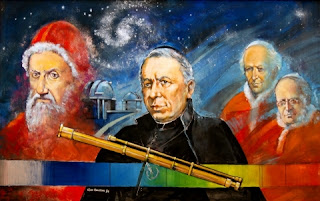The Vatican Aims to Dispel the Conflict between Faith and Science
The Vatican
Aims to Dispel the Conflict between Faith and Science
By E. Stanley Ukeni
The conventional wisdom has
been that science and religion maintains divergent views on creation. To most
fundamental Christian adherent, the notion of Christian-Scientist would be considered an oxymoron. It’s understandable that many, especially on the Christian side,
would find the two disciplines irreconcilably contradictory.
In what would come as a shock
to many, the Catholic Church has long held a seemingly convergent view on the
subject. Although the ancient history of the Catholic Church is filled with
instances of the Church’s efforts to suppress the advancement of science and
indeed past persecutions of eminent scientists such as Galileo, its more modern
history however chronicles its sustained efforts to advance the frontiers of
science.
As a testament of the holy
church’s dedication to the enhancement of human understanding of our temporal
world and the broader universe, over the centuries, Catholic universities
around the world have graduated world-class scientists who have made incredible
strides in the advancement of the body of scientific knowledge.
This uncelebrated effort of the
Catholic Church to support the fields of human knowledge is exemplified by the
groundbreaking achievement of Monsignor George Lemaitre—a Jesuit Priest, is considered
to be the father of the scientific theory that the universe began with a
gigantic explosion. As well as being a Catholic Jesuit Priest, Monsignor
Lemaitre was regarded within the scientific community as one of the world’s most
renowned cosmologists.
It was Monsignor George
Lemaitre who, in 1927, first theorized that the receding of distant galaxies
was caused by the expansion of the universe. He arrived as this astonishing
conclusion after solving the scientific equations of Einstein’s theory of
general relativity. Lemaitre’s theory was known as the ‘primeval atom’ but it
is more commonly known today as the big-bang theory.
The head of the Vatican
Observatory—a Jesuit Brother, Guy Consolmagno, suggested in an Associated Press
release that Monsignor Lemaitre’s revolutionary scientific accomplishment is a
testament that we can believe in God and the big-bang theory.
In honor of the accomplishment of
Monsignor George Lemaitre, the Vatican Observatory has invited the world’s
leading scientists and cosmologists to a conference. The event will be held from
Tuesday May 9th 2017 through to Friday May 12th 2017.
This gathering is not aimed at
discussing issues pertaining to religion and science. Rather, the topics of the
conference will range from discusses on black holes, gravitational waves to
such arcane subjects as space-time singularities.
Brother Guy Consolmagno has
been quoted as saying, “Christians believe in a supernatural God who is
responsible for the existence of the universe, while our science tells us how
He did it.”
The choice of venue is quite
symbolic, as the Vatican Observatory was founded by Pope Leo XIII in 1891 to help
dispel the conventional impression that the Roman Catholic Church was unaccommodating
to scientific discoveries.
This should be an interesting
event. Who knows, perhaps one or two groundbreaking scientific papers will be
presented at the conference.
Authored by E. Stanley Ukeni, ©
2017. All Rights Reserved. This material and other articles or stories posted
on this blog site may not be reproduced, published, broadcast, rewritten or
redistributed, in whole or in part, without prior expressed written permission
from the author, E. Stanley Ukeni.
You are invited to follow E.
Stanley Ukeni on twitter at; @EzStan . You’re equally invited to follow him on
google+. Oh yeah, don’t forget to subscribe to this blog Site. Thanks.
Photo Credits: Vatican
Observatory;





“Christians believe in a supernatural God who is responsible for the existence of the universe, while our science tells us how He did it.” That's an interesting statement that probably supports the ontological argument;".. From the movement of things in the world, an unmoved prime mover is inferred. Therefore God is the unmovable mover". The scientist does not just explain how the unmoved prime mover (God) did it, but will soon trace all its findings back to the unmovable mover (God) demystifying science, yet proving God. That's the irony of it.
ReplyDelete